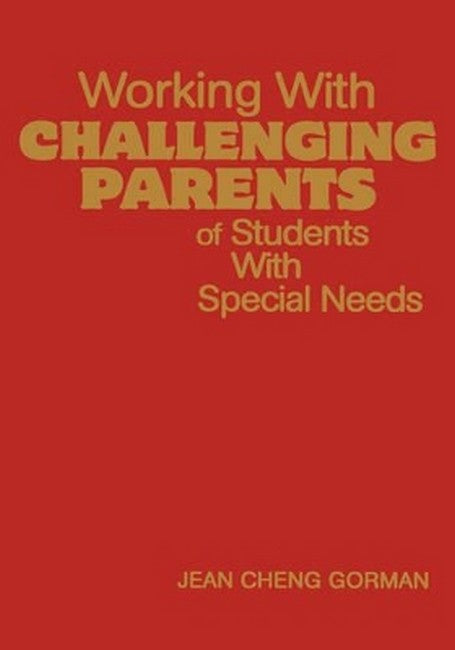Jean Cheng Gorman, Psy.D., is a licensed psychologist and the author of Emotional Disorders and Learning Disabilities in the Elementary Classroom: Interactions and Interventions (2001, Corwin Press). After teaching in urban and suburban elementary schools, Jean obtained her doctorate in Child and School Psychology at New York University. Her interests in collaborating with parents has included research on Chinese methods of parenting as well as culturally-sensitive parenting programs. Other professional interests include working with children who are medically-fragile and enhancing parent-child relationships in infancy and early childhood. Jean currently lives with her husband and two children in Northern California.
Request Academic Copy
Please copy the ISBN for submitting review copy form
Description
Preface Acknowledgements About the Author Dedication 1. Generating Alliances...not Lawsuits Gaining Cooperation Developing Alliances Being Empathic Communicating Well Communicating Poorly Staying Out of Court Keeping Your Focus Reflecting on Your Teaching Summary 2. Dealing with Anger Entering The Conflict Stage Understanding Anger Being Aware of Cultural Differences in Anger Dealing with The Openly Angry Parent Dealing with The Parent Who Is Always Angry Dealing with The Narcissistic Parent Ensuring Your Safety Main Principles for Dealing with Anger Other Strategies for Dealing with Anger What to Avoid Dealing with Anger ... Yours Going Beyond Anger Reflecting on Your Teaching Summary 3. Dealing with Denial Understanding Denial Discriminating Between Denial and Defensiveness Dealing with Differences of Opinions Knowing When Denial is Harmful (and When It Is Not) Main Principles for Dealing with Denial Other Strategies for Dealing with Denial What to Avoid Going Beyond Denial Reflecting on Your Teaching Summary 4. Dealing with Dissatisfaction Recognizing the Context of Dissatisfaction Understanding Dissatisfaction Responding When Parents Reject the Individual Education Plan (IEP) Coping with the Consequences of Dissatisfaction Handling Mediation and Due Process Hearings Main Principles for Dealing with Dissatisfaction Other Strategies for Dealing with Dissatisfaction Working with Advocates What to Avoid Going Beyond Dissatisfaction Reflecting on Your Teaching Summary 5. Dealing with Nonparticipation and Resistance Sharing Teachers' Views Discerning Noninvolvement Versus Nonparticipation Understanding Nonparticipation Understanding Nonparticipation of Parents of Adolescents Being Sensitive to Concerns of Culturally and Linguistically Diverse Parents Main Principles for Dealing with Nonparticipation and Resistance Suggestions for Increasing Parent Participation in Transition Planning Other Strategies for Dealing with Nonparticipation Other Strategies for Dealing with Resistance What to Avoid Going Beyond Nonparticipation and Resistance Reflecting on Your Teaching Summary 6. Dealing with Mistrust Recognizing The Value of Trust Understanding Mistrust Acknowledging Other Reasons for Parental Mistrust Agreeing on an Individual Transition Plan (ITP) Preventing Mistrust Main Principles for Dealing with Mistrust Other Strategies for Dealing with Mistrust What to Avoid Going Beyond Mistrust Reflecting on Your Teaching Summary 7. Working with Nontraditional Families Working with Grandparents Working with Noncustodial Parents Working with Foster Parents Working with Homeless Families Working with Families Where You Suspect Child Abuse or Neglect Reflecting on Your Teaching Summary 8. Cultivating Collaborative Relationships Resolving Your Reservations Applying Cultural Considerations Starting at the Beginning Maintaining the Relationship Passing the Torch Promoting a Family-Friendly School Being Realistic Reflecting on Your Teaching Summary References Table 1.1 Effective Communication Skills Table 1.2 Poor Communication Skills Table 2.1 Safety Tips for Teachers Meeting with Parents Resource A. Welcome Letter Resource B. Communication Log Resource C. Letter to Parents of Older Elementary Students Resource D. Letter to Parents of Adolescents Resource E. Parent Observation Sheet Resource F. Back-to-School Letter Resource G. Responsibilities of Team Members Resource H. Intake Conference Letter Resource I. Conference Summary Sheet Resource J. Additional Resources References Index
This practical guide will help avert obstacles and clear the way for a healthy and productive working relationship that will benefit the individuals who are at the center of the enterprise-the children! -- Lawrence Balter, Professor This book should be used by every teacher. School districts should be providing professional development classes and higher education should be addressing the challenging components of teaching that Gorman addresses. -- Mary Ellen Somers, NBCT

